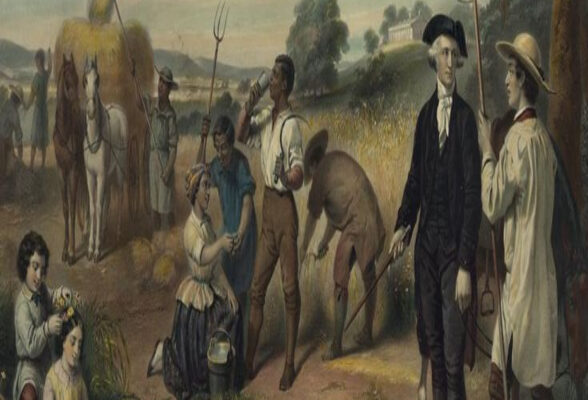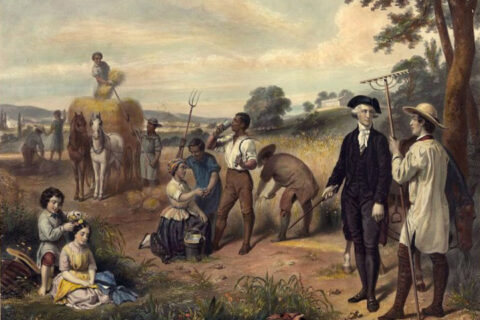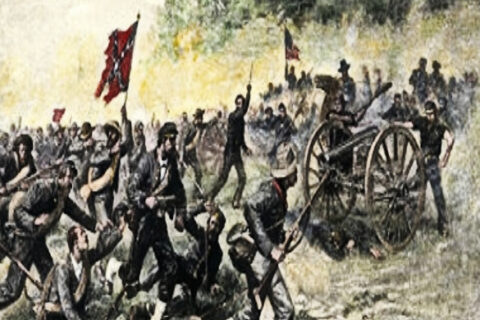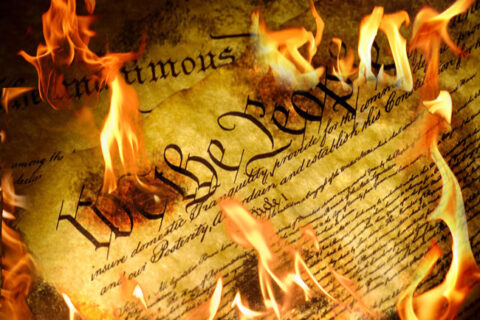“Slavery is only one of the minor issues and the cause of the war, the whole cause, on our part is the maintenance of the independence of these states… neither tariffs, nor slavery, nor both together, could ever been truly called the cause of the secession… the sovereign independence of our states. This, indeed, includes both these minor questions, as well as many others even greater and higher.”
The Daily Richmond Examiner, August 2, 1864
“In his message, Mr. Lincoln announced a great political discovery. It was that all former statesmen of America had lived, and written, and labored under a great delusion that the States, instead of having created the Union, were its creatures; that they obtained their sovereignty and independence from it, and never possessed either until the Convention of 1787.”
Edward A. Pollard, The Lost Cause : A New Southern History of the War of the Confederates
When it comes to slavery’s involvement in secession, most everyone fits comfortably within one of two groups, neither of which is correct. The first argues that slavery had nothing to do with secession; the other claims slavery was the sole cause.
Slavery had varying degrees of influence on the Deep South’s decision to secede. There is no question that some in the South were willing to leave the Union to preserve slavery if it came to that. Southern slave owners viewed Northern abolitionists as foreign invaders dictating their lives. To Southerners, slavery was a constitutional, Biblical, and state right, and no Northern radical was to have greater authority. Thomas Jefferson said that slavery was, “The exclusive right of every state.”
The Cotton States had great economic importance riding on slavery, Mississippi alone had four billion dollars’ worth of value invested in slaves, and almost the whole economic system of the state depended on slavery. They wished to defend the financial system that had brought them so much prosperity. Yet even in Mississippi, slavery was not the sole cause of secession. James McPherson quotes the Jackson Mississippian, “Let not slavery prove a barrier to our independence… although slavery is one of the principles that we started to fight for… if it proves an insurmountable obstacle to the achievement of our liberty and separate nationality, away with it.”
Many causes led to the secession of the Deep South. Yet, I would not wholly disagree if someone were to say that slavery was the leading cause of withdrawal in the Deep South. But there is a vast difference between saying that the South left solely to keep slaves in bondage and saying that the federal intrusion on states’ rights over the issue of slavery was the leading cause of separation. Many overstate slavery’s involvement in the Deep South’s secession because slavery was the “occasion” to which the fight over the nature of the Union was fought.
“That institution is not a cause of this war, but simply an occasion of it. It is only the object against which the radicalism of the North has arrayed itself in Abolitionism. Had not this object existed, that Dragon from the bottomless pit, would have discovered some other eminence of Southern life, on which to expend its fury. We are leading the great battle for the sum of modern history–for the regulated liberty and civilization of the age. It is conservative religion against atheism–constitutional law against fanatical higher law–social stability against destructive radicalism.”
Rev. William A. Hall, The Historic Significance of the Southern Revolution, Printed by A. F. Crutchfield, Petersburg, Virginia, 1864
The leading cause of separation was not preserving something these states already had legal protection for, that is, slavery. Instead, it was the federal expansion past its constitutional limits and encroachments upon the states’ rights. Is the federal government restricted to the powers given in the Constitution? Or was it released to step outside of its delegated powers, thus nullifying the Constitution and limited government? In 1864, Confederate General Patrick Cleburne said, “Between the loss of independence and the loss of slavery, we assume that every patriot will freely give up the latter. Give up the negro slave rather than be a slave himself.”
“The powers not delegated to the United States by the Constitution, nor prohibited by it to the States, are reserved to the States respectively, or to the people.”
10th Amendment, U.S. Constitution
“The Constitution… contains no grant of power to the Federal Government to interfere with this species of property… slave property rests upon the same basis, and is entitled to the same protection, as every other description of property.”
Isham G. Harris, Call for a Referendum on a Tennessee Secession Convention, January 7, 1861
In 1862, Rose Greenhow wrote, “Slavery, although the occasion, was not the producing cause of dissolution.” R. L. Dabney wrote, “Slavery was not the cause, but the occasion of strife… Rights of the states were the bulwarks of the liberties of the people, but that emancipation by federal aggression would lead to the destruction of all other rights.” Just as decades earlier, John Calhoun had identified the tariff of abominations as, “The occasion, rather than the real cause” of dispute. The real issue was over a limited central government.
Where you stand on the “real cause” will necessarily cause disagreement on any issue that arises, a national bank, internal improvements, slavery and so on. If the two sides fundamentally disagreed on the Constitution and the purpose of the central government, they could then never agree on any of these side issues. In Virginia Iliad, H.V Traywick quotes an article in the New York Times on April 8, 1861, stating, “Slavery has nothing whatever to do with the tremendous issues now awaiting decision… The question which we have to meet is precisely what it would be if there were not a negro slave on American soil.”
Since the ratification of the Constitution, a conflict had been fought over whether we were to maintain a federated republic as understood by the states or if we were to become a centralized nation to benefit the most powerful interests and political parties. This debate raged politically on many battlefields before 1860. However, slavery was the chosen battleground of the nationalists in the fight to transform the Union in 1860. Instead of just a political issue, they would transform it into a moral issue.
The Republicans violated the Constitution and the Dred Scott v. Sandford 1857 Supreme Court ruling by trying to decide the fate of slavery by federal rather than state and individual controle. Democratic plank 9 of the 1852 elections plainly stated that an attack on slavery was an attack on states’ rights; you cannot separate the two issues. You cannot have the federal government decide on slavery without it greatly exceeding its original intent and purpose.
“That the federal government is one of limited powers, derived solely from the Constitution, and the grants of power made therein ought to be strictly construed by all the departments and agents of the government; and that it is inexpedient and dangerous to exercise doubtful constitutional powers.”
Democratic Plank 1, 1852
“That Congress has no power under the constitution to interfere with or control the domestic institutions of the several States, and that such States are the sole and proper judges of everything appertaining to their own affairs not prohibited by the constitution; that all efforts of the abolitionists or others made to induce Congress to interfere with questions of slavery, or to take incipient steps in relation thereto, are calculated to lead to the most alarming and dangerous consequences.”
Democratic Plank 9, 1852
The South viewed slaves the same way they did any other legal property. If the government interfered with slaves, what would stop them from doing the same with any other property? If this violation by the federal government were allowed to happen, no rights would be safe: the Constitution would then be of no value. The Union of states that delegated certain limited powers to the federal government would be destroyed. And finally, the government would become limitless in power.
If the government was allowed to abandon any of its limitations, it would begin to dictate all manner of regulations and exert jurisdiction it previously was never considered to have. After a quick look at our lives today, who can say the South was incorrect in their assessment? The effects of the federal government stepping into areas past its jurisdiction delegated by the states are commonplace today. The Constitution is set aside so long as the masses’ emotions are stirred over any one topic. Politicians and media provoke the mob, and no Constitution or ideas about limited government can stop them. We have become an unlimited democracy ruled by a mob; the North destroyed the old Republic and Constitution in 1860. As a result, most outlaws in America today are found among elected officials and judges, and we simply accept their lawlessness because we have grown accustomed to servitude.
Well before the War, on July 4, 1854, famed abolitionist William Lloyd Garrison publicly burned a copy of the Constitution and spoke of it as a, “Covenant with Death, an agreement with Hell.” Abolitionist John Brown seceded from the Union and created his own anti-slavery provisional Constitution. In the book, The South Vindicated from the Treason and Fanaticism of the Northern Abolitionists 1836; former South Carolinian Congressman William Drayton wrote, “The abolitionists in urging their designs against the South, are guilty of infringing the acknowledged rights of those states… it looks to revolution, it teaches that the Constitution “is null and void” when opposed to their schemes.” In other words, whatever the issue was, the Constitution could take a back seat if it impeded the political agenda of the day.
An unregulated democracy, such as our government today, has more power and violates our rights more than when we were under King George; it is not even comparable. In Red Republicans and Lincoln’s Marxists, Al Benson, Jr and Walter Kennedy write, “By focusing upon slavery, the bona fide story of the death of real states’ rights and the beginning of Imperial America is overlooked… we stand naked before the awesome power of our federal master.”
Unlike today, antebellum America was a time when the federal government did not spread into the dominion of the states. Through the states, people were allowed self-rule and self-governance. Southerners understood that if the federal government was allowed to infringe on the states’ rights issue of slavery, it would become an authoritarian body that no longer followed its limitations under the Constitution. These were the costs of the South’s defeat in the Civil War; self-governance, and limited government.
To desire a limited government and maintain the Constitution as handed down for generations, one did not need to be pro-slavery. Northern writer Frederick Law Olmsted opposed slavery but objected to abolishing it “by federal edict.” In 1864, Vermont Bishop John Henry Hopkins wrote A Scriptural, Ecclesiastical, and Historical View of Slavery, where he supported the South and the compact theory of the Union, arguing for gradual and consensual abolition.
Southerners heeded the warnings of the Founders. In a letter to Charles Hammond on August 18, 1821, Thomas Jefferson wrote, “When all government domestic and foreign in little as in great things shall be drawn to Washington as the center of all power, it will render powerless the checks provided of one government on another, and will become as venal and oppressive as the government from which we separated.”
“I consider the foundation of the Constitution as laid on this ground: That “all powers not delegated to the United States, by the Constitution, nor prohibited by it to the States, are reserved to the States or to the people. To take a single step beyond the boundaries, thus specially drawn around the powers of Congress is to take possession of a boundless field of power, no longer susceptible of any definition.”
Thomas Jefferson, “Opinion on the Constitutionality of a National Bank” February 15, 1791

Jeb Smith is the author of four books, the most recent being Missing Monarchy: Correcting Misconceptions About The Middle Ages, Medieval Kingship, Democracy, And Liberty. Before that, he published The Road Goes Ever On and On: A New Perspective on J. R. R. Tolkien and Middle-earth and also authored Defending Dixie’s Land: What Every American Should Know About The South And The Civil War, written under the name Isaac C. Bishop. Smith has authored dozens of articles in various publications, including History is Now Magazine, The Postil Magazine, Medieval History, Medieval Magazine, and Fellowship & Fairydust and featured on various podcasts including The Lepanto Institute.






Happy Thanksgiving, Dixians!
Back at you!
One thing I think we can agree on is that the Republic was destroyed by Lincoln and the Republicans in 1861.
Here is an excerpt from a book published in 1858 in which i have, called, ‘The exiles of Florida’ by Joshua R. Giddings p. 331.
(Exiles are run away slaves.)
‘ The Seminole agent, learning the outrage, at once repaired to the nearest judge in Arkansas, and obtained a writ of habeas corpus. The Exiles were brought before him in obedience to the command of the writ, and a hearing was had. The Agent showed the action of General Jessup; the sanction of the capitulation of March 1837, by the Executive; the opinion of the Attorney General, and action of the president, deciding the Exiles to be free, and in all respects entitled to their liberty. But the Judge decided that the Creeks had obtained title by virtue of their contract with General Jessup; that neither General Jessup, nor the President, had power to emancipate the Exiles, even in time of war; that the Attorney General had misunderstood the law; that the title of the Creek Indians was legal and perfect; and they, having sold them to the claiment, his title must be good and perfect.’
I thought I would share that little bit of federal over reach and that book.
Happy Thanksgiving
This was a good article otherwise, but the notion that we live in an actual democracy governed by mob rule isn’t true nor ever was true. If it were true, popular referendums couldn’t so easily be overturned by activist courts, as one example among several I could cite. I like that you quote Dr. Dabney in the article, so I will quote him further to the particular point:
I believe Dr. Dabney wrote “ultra democratic” in the same spirit that you write “unregulated democracy” in the article. Difference being of course that he fully understood that it’s all an illusion designed to con the populace into believing they’re running things when they’re most assuredly not.
And I agree with the insightful Dabney! I also reject the idea that democracy is for the people, it degrades into an oligarchy every time, it is designed to do so.
https://www.amazon.com/Missing-Monarchy-Correcting-Misconceptions-Democracy/dp/B0D6BJPSFY/ref=sr_1_1?dib=eyJ2IjoiMSJ9.w1w-d3wMhZDgk8Dk5yg8df58yAoabb0fewB1GmUo77w.Ol0AamqwLd6GZlfHdphGK5FtUUybMdS3Znn65ggWNLs&dib_tag=se&hvadid=705627571649&hvdev=c&hvlocphy=9059687&hvnetw=g&hvqmt=e&hvrand=4783140918868339244&hvtargid=kwd-2327372943551&hydadcr=15306_13517965&keywords=missing+monarchy+jeb+smith&qid=1732973378&sr=8-1
You might also enjoy this that I wrote
https://historymedieval.com/representation-and-written-constitutions-the-origins-of-freedom/
That’s a superb quote from Dabney you provided. I searched and found it’s from ‘The New South’ address at Hampden-Sydney College in 1882 in Vol. 4 of the Discussions.
It reminds me so much of the book I just finished: a collection of essays with an introduction by Joachim Von Ribbentrop called ‘Germany Speaks’, by Ostara Publications.